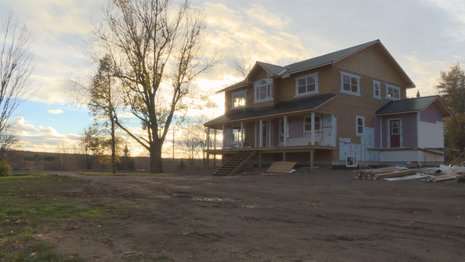Farm house was destroyed by a fire in 2011
By Diego Flammini
Assistant Editor, North American Content
Farms.com
A dairy farm in Fredericton Junction, New Brunswick that sat abandoned since 2015 is being brought back to life by an Ontario family.
The farmhouse at the Atlantic Dairy and Forage Institute, a research facility and working farm created by local dairy producers, was destroyed by a fire in 2011.The institute then shut down in 2015 and remained without animals, crops and farm life. That is, until the Aziz family began to bring sheep, chickens, cattle and other farm animals back before renaming it Riverhaven Acres Farm.
“It’s coming to life for us because we are both enjoying it,” Tarita Aziz told CBC. “We go to bed tired. We’re asleep in no time. But yet we have a purpose for every day. And every day you come out and say good morning to the animals.”

The new farm house at Riverhaven Acres Farm.
Photo: Shane Fowler/CBC
Tarita’s husband Lenzi left a job as an investment banker to pursue a rural lifestyle.
“I’m an accidental farmer,” he told CBC. “This used to be an experimental farm, it still is, I’m experimenting (and) I’m learning every day.”
The couple is building a new farmhouse, but their current focus is on the animals.
“As a home needs people and their spirits in it, a barn needs animals,” Tarita told CBC. “So in order for us to call it our farm we wanted to renovate it so animals could start living there.”